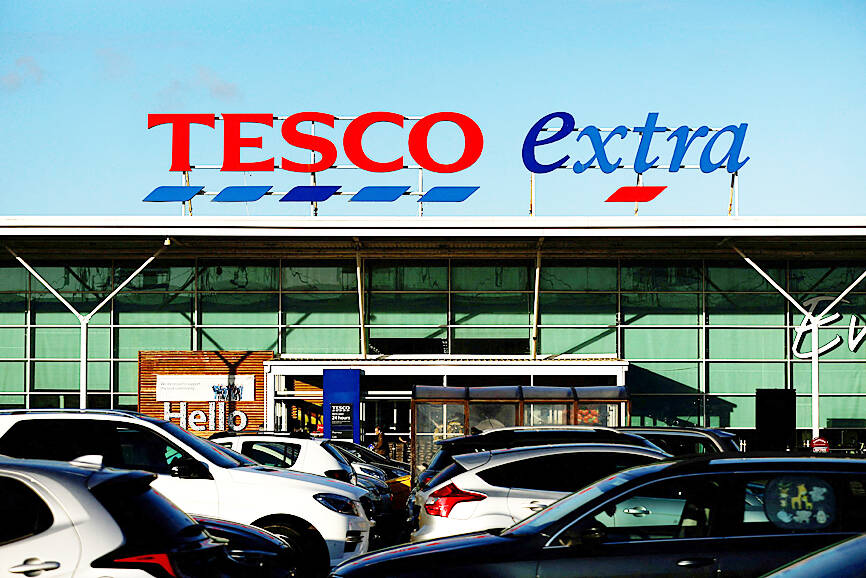Tesco PLC is facing a UK lawsuit brought by Burmese migrants in Thailand, who claim that one of the supermarket giant’s former clothing suppliers used their forced labor, lawyers said on Monday.
“Burmese migrants were made to work up to 99 hours a week on unlawful wages and in forced labor conditions at a Thailand factory making clothes for Tesco’s F&F fashion range,” said law firm Leigh Day, which represents the 130 claimants.
The claimants are demanding compensation from Tesco and its Thai subsidiary at the time, Ek-Chai, which it sold in 2020.

Photo: Reuters
They accuse the companies of being “unjustly enriched at the expense of the adult workers.”
The suit would also target Intertek, the insurance and auditing group that inspected the factory where the alleged forced labor took place.
If a settlement is not reached, the case is to be pursued in the High Court in London, the legal firm said in a statement.
The workers were employed in the VK Garments factory in Mae Sot, northwest Thailand, between 2017 and 2020, where they cut, made and packed garments to be sold in Thailand.
They were paid a maximum of £4.00 (US$4.86) per day, and claim they worked at a relentless pace for seven days a week and lived in tiny dormitories where they slept on a concrete floor.
Tesco on Monday said in a statement that the claims were “incredibly serious,” and that if it had “identified issues like this at the time they took place, we would have ended our relationship with this supplier immediately.”
Although Tesco was not involved in the day-to-day running of the factory, it said that it “would continue to urge” its former supplier “to reimburse employees for any wages they’re owed.”
Compensation has so far only been awarded by the Thai courts, and only for severance pay.
Intertek also said the allegations were serious, but that it would not comment while legal proceedings were ongoing.
Separately, 10 investment companies with assets totaling about £800 billion, including Schroders and Quilter Cheviot, on Monday signed a joint appeal calling for UK food retailers and the government to be increasingly vigilant about forced migrant labor in British agriculture.
Many migrant workers in the UK have had to pay large travel costs and “excessive fees to agents and middlemen,” often finding themselves saddled with debts, they said.
The UK’s main farming union early this month warned that the UK was heading for a food-supply crisis, mainly due to a lack of visas to bring in seasonal workers, who are in short supply after Brexit.
The government on Friday announced plans to increase the number of seasonal visas available next year from a maximum of 40,000 to 45,000, with the possibility of an additional 10,000 if needed.

COMPETITION: AMD, Intel and Qualcomm are unveiling new laptop and desktop parts in Las Vegas, arguing their technologies provide the best performance for AI workloads Advanced Micro Devices Inc (AMD), the second-biggest maker of computer processors, said its chips are to be used by Dell Technologies Inc for the first time in PCs sold to businesses. The chipmaker unveiled new processors it says would make AMD-based PCs the best at running artificial intelligence (AI) software. Dell has decided to use the chips in some of its computers aimed at business customers, AMD executives said at CES in Las Vegas on Monday. Dell’s embrace of AMD for corporate PCs — it already uses the chipmaker for consumer devices — is another blow for Intel Corp as the company

ADVANCED: Previously, Taiwanese chip companies were restricted from building overseas fabs with technology less than two generations behind domestic factories Taiwan Semiconductor Manufacturing Co (TSMC, 台積電), a major chip supplier to Nvidia Corp, would no longer be restricted from investing in next-generation 2-nanometer chip production in the US, the Ministry of Economic Affairs said yesterday. However, the ministry added that the world’s biggest contract chipmaker would not be making any reckless decisions, given the weight of its up to US$30 billion investment. To safeguard Taiwan’s chip technology advantages, the government has barred local chipmakers from making chips using more advanced technologies at their overseas factories, in China particularly. Chipmakers were previously only allowed to produce chips using less advanced technologies, specifically

MediaTek Inc (聯發科) yesterday said it is teaming up with Nvidia Corp to develop a new chip for artificial intelligence (AI) supercomputers that uses architecture licensed from Arm Holdings PLC. The new product is targeting AI researchers, data scientists and students rather than the mass PC market, the company said. The announcement comes as MediaTek makes efforts to add AI capabilities to its Dimensity chips for smartphones and tablets, Genio family for the Internet of Things devices, Pentonic series of smart TVs, Kompanio line of Arm-based Chromebooks, along with the Dimensity auto platform for vehicles. MeidaTek, the world’s largest chip designer for smartphones

TECH PULL: Electronics heavyweights also attracted strong buying ahead of the CES, analysts said. Meanwhile, Asian markets were mixed amid Trump’s incoming presidency Taiwan Semiconductor Manufacturing Co (TSMC, 台積電) shares yesterday closed at a new high in the wake of a rally among tech stocks on Wall Street on Friday, moving the TAIEX sharply higher by more than 600 points. TSMC, the most heavily weighted stock in the TAIEX, rose 4.65 percent to close at a new high of NT$1,125, boosting its market value to NT$29.17 trillion (US$888 billion) and contributing about 400 points to the TAIEX’s rise. The TAIEX ended up 639.41 points, or 2.79 percent, at 23,547.71. Turnover totaled NT$406.478 billion, Taiwan Stock Exchange data showed. The surge in TSMC follows a positive performance